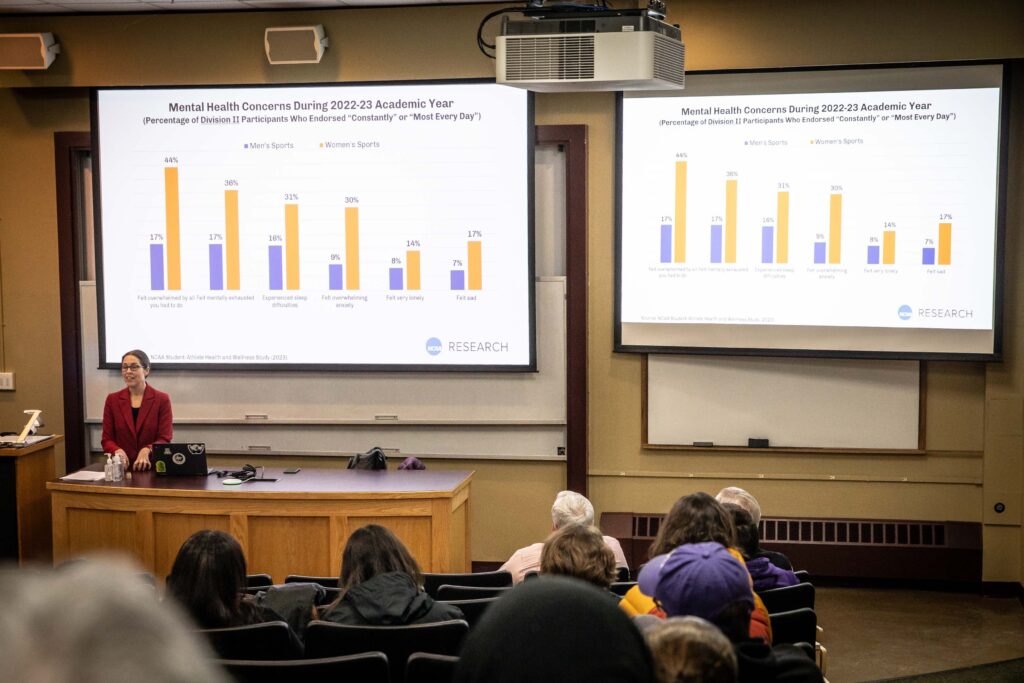On Feb. 14 students and staff gathered to listen to “Surviving or Just Thriving? Student Athlete Health and Wellness Post Pandemic,” presented by the Director of Research and Policy at the National Collegiate Athletics Association (NCAA), Lydia Bell. During the presentation, Bell spoke about the data from an NCAA substance use and mental health survey.

Lydia Bell (Photo by Cat Cutillo)
Bell explained that the NCAA sent out a nationwide survey to each school’s Faculty Athletic Representative (FAR), who then administered the survey to a few teams preselected by the NCAA. The survey was a paper and pencil survey that was anonymous and voluntary. Across the NCAA divisions there were 23,000 participants, with about 6,000 from division II. The data Bell presented was specific to division II schools during the 2022-2023 academic year.
Bell first covered substance use.
“There is a continued decline in alcohol use in student athletes,” Bell said. “This is the lowest number we have seen in alcohol use.”
One substance that has increased is vaping and e-cigarette use. This increase could be due to the age of the students taking the survey. When these athletes were in high school vaping was very accessible, Bell explained. Bell is curious to see if the trend will start to decline, with more regulations put in place.
Bell then moved into mental health. The survey asked questions about feeling mentally exhausted, overwhelmed, and whether the student athletes experienced sleep difficulties.
“They reported feeling these mental health concerns either constantly or almost every day,” Bell said. The numbers were higher for women as well as those who are part of the LGBTQIA+ community.
“Part of the work we are trying to do in research is think about all the various strands of identity of our athletes whether it’s racial identity, socioeconomic status, gender identity, sexual orientation, and really think about how all the different components of the athlete themselves impacts their mental wellness,” Bell explained.

Lydia Bell (Photo by Cat Cutillo)
When asked what is driving their negative mental health, most of the answers were not athletics related. The biggest cause of anxiety was academic worries followed by financial worries and the future.
A majority of student athletes said they feel their coaches care about their mental health, but only 54% of men and a third of women feel comfortable talking to their coaches about mental health. This could be due to stigma, but it could also be that there are more resources on campus so students may not want to talk to coaches about mental health, Bell explained.
The survey also addressed whether the student athletes felt adequately rested. Sleep is something that a lot of college students struggle with, not just athletes. The NCAA survey found that about 50% of athletes say that they wake up well rested less than three days a week. Only 14% of women felt well rested most days of the week. Bell emphasized the importance of sleep, in general, in addition to their athletic performance.
“Sleep is an amazing, free and legal, performance-enhancing drug,” Bell said.
The NCAA found that athletes who specialized in sports by age 12 were more likely to experience physical and mental burnout than those who did not. In addition, athletes who sustained one or more major injury, either requiring surgery, hospitalization, or at least one month away from the sport before college were more likely to face a major injury in college.

Lydia Bell (Photo by Cat Cutillo)
Another major focus of the study was on weight and body image. The survey data indicated that most participants felt like they were the right weight for their sport. For those who did not feel like they were the right weight, however, men were more likely to say that they are underweight, and women were more likely to say they are overweight.
Although two-thirds said they felt they were the “right weight for their sport,” more than 40% of men said they were trying to gain weight and more than 40% of women said they were trying to lose weight.
“Clearly it is not their sport that is driving their perceptions of their body. There might be other outside factors,” Bell explained.
All of the data Bell presented is available to the public and can be found here.

For all press inquiries contact Elizabeth Murray, Associate Director of Communications at Saint Michael's College.






